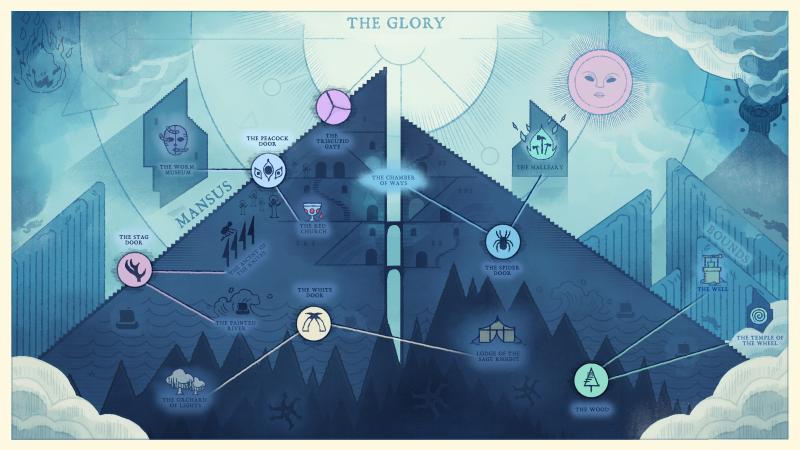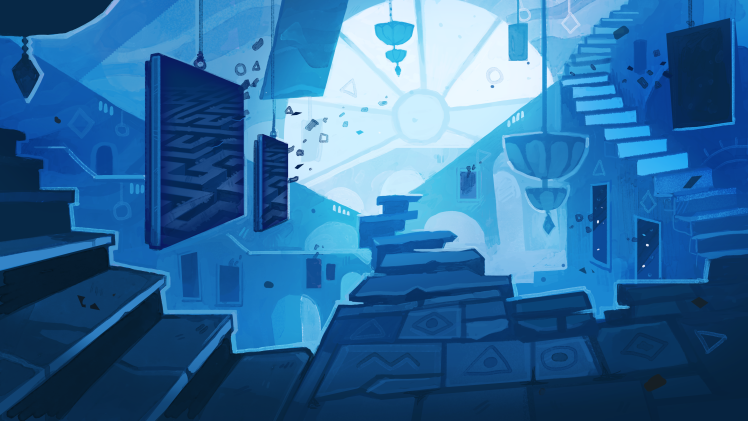Weather Factory’s Cultist Simulator has a straightforward name, but the game itself isn’t so easily defined. It’s interactive fiction that trades in digital cards. It’s filled with intricate text describing otherworldly events, but players are urged to make quick decisions by ticking clocks. It’s a roguelike, where death is final and characters and items arrive in mysterious, randomized ways. After a successful Kickstarter crowdfunding campaign, the developer’s debut effort is slated for a May 31 release on PC.
Failbetter Games founder Alexis Kennedy and Failbetter producer Lottie Bevan started the studio to experiment further with narrative games. And Cultist Simulator does have the hallmarks of Kennedy’s previous works like Fallen London and Sunless Sea, both of which feature Lovecraftian gothic terrors and cryptic adventures. Likewise, Cultist Simulator is set in an enigmatic world that seems to exist in a reality fractured by some ineffable force. And your role in the matter is vaguely defined — you can choose to start a cult and chase mysteries, or you can live a quiet life and retire peacefully.
“There are things that are unambiguously failure endings, where you die or go mad, and there’s unambiguous success endings, where you ascend and become immortal, abandoning your followers and burning yourself in a series of progressively hotter fires and acquiring a series of inhuman marks,” said Kennedy. “And then there are some in-between endings, where you can get promoted at work often enough—you can start putting passion as well as reason into your work, and if you do that sufficient times, it’ll warn you that you’re approaching an endgame state and you retire happily.”
I interviewed Kennedy and Bevan at the Game Developers Conference in San Francisco last month, and I tried out an early version of Cultist Simulator. Like other digital card games, your playing field is a table and card represent your units, items, and other actions. You obtain characters — like Inspector Wakefield, who appears and looks into your shadowy deeds if you begin talking to the wrong people — and resources like health and funds. Some cards are books or locations, which can yield other items you examine them further. But you also get more abstract ones, like Contentment, Erudition, and A Buzzing in the Brain.
June 5th: The AI Audit in NYC
Join us next week in NYC to engage with top executive leaders, delving into strategies for auditing AI models to ensure fairness, optimal performance, and ethical compliance across diverse organizations. Secure your attendance for this exclusive invite-only event.
In order to do anything, you must move the cards to action hubs like Explore, Study, Talk, and Dream. Some new ones appear when you’re in trouble, like if you run out of health or if the Inspector has begun an investigation on you. These yield cards that could have negative effects, like an affliction or notoriety. You must balance these different elements all while you’re plagued by timers, which mark how long it takes for you to generate new funds or when a card will disappear into the ether. If you’d like to take a moment to read the prose, though, you can always hit the pause button.
“Obviously you’re playing with tokens, and some of them represent things that aren’t real. Abstract things like reason and passion and scholarship,” said Bevan. “But some of them represent—I like that you end up treating people in the same way you end up treating intangible things or books, because that feels kind of horrible? You role play this mastermind of a cult that doesn’t care about who they are involved with.”

The latest version of Cultist Simulator has improved graphics and animations. The cards blink as though they’re waiting for you to make your next move. And Weather Factory has also added in three character “classes” — the Aspirant, Physician, and Bright Young Thing — and it will add more before the final release.
Each of these shifts the places you can explore and starts you off with different resources. The Bright Young Thing, for instance, is an upper-crust dilettante who whiles away their hours and relies on their father’s wealth. They start off with a lot more money than the other classes, and their introduction to the occult can occur at an otherworldly cabaret. In contrast, Bevan describes the Aspirant as a “Lovecraftian antihero, a weird scholar who’s quite obsessed and impoverished.”
When you die, your previous characters will pop up in the game’s lore. As the Physician, I encountered my previous Bright Young Thing character in my doctor’s notes. In another playthrough, I heard whispers of an Aspirant who wasted away while pursuing the occult. Soon, my world was populated with ghosts of my past lives, because Cultist Simulator is tough and it’s not always easy to figure out what to do next. Bevan says that they expect players to die often, and each incarnation will add to the experience.
“But also because every time you play through you learn a bit more about the world, because you happened to draw this card instead of that card this time, so you get that snippet of text,” said Bevan. “But also because every time you play, you think, ‘Right, now I know that this card combines with this card to do this.’ You can build upon that.”
The callbacks to previous characters add an unnerving quality to the game, and build out a world that is already teeming with murmured secrets. As an example, Bevan refers to a romantic affair between the authors of some of the books you can acquire, which you’ll only notice if you pay attention. This adds a layer of depth in a game where you can sometimes feel like a lonely Machiavelli.
The biggest secret of all, though, is the Mansus. If you Dream often enough and find yourself on a certain path, the tabletop disappears and you’re left with an ethereal world map. Kennedy and Bevan showed me in a developer build, and it was a truly stunning moment that makes it feel like you’ve glimpsed what reality actually looks like in the game.
“We have all these layers, and the thing about the skin of the world being what you’re plucking away at keeps coming up,” said Kennedy. “[The Mansus is] the place behind the world that you can visit in dreams. We wanted to establish the tabletop, establish this metaphor, have it become so omnipresent and invisible that you stop noticing it, and then, when people unlock the right combination of dreams, we do this.”
Weather Factor’s intricate game has already won accolades, even though it hasn’t launched. It took home the award for the best game design at the Emotional Games Awards, beating out titles like Ninja Theory’s Hellblade: Senua’s Sacrifice, Playdead’s Inside, and Giant Squid’s Abzu.
Once the base game is out, the studio plans on releasing DLC in the form of expansion packs.
“Once people see the tabletop game, if we repeat that in other ways, if you travel to a different city, or even if you start in a different era, that opens up a lot of opportunities with potentially relatively small amounts of dev work. But above all it’s card backs,” said Kennedy. “Our whole thing at the moment is keeping our costs low, because every pound we don’t spend on development is a pound we don’t have to make back in sales, so we can keep experimenting.”
After GDC, I’ve logged some hours in exploring Cultist Simulator’s world. I’ll readily admit that I haven’t been able to make it back to the Mansus just yet in my own playthroughs because I keep getting arrested. Some of the card combinations elude me, and no one wants to join my cult. It will be interesting to see what other little puzzles and morsels of intrigue Weather Factory will add in the full game. Getting into the occult is a tricky business, but it’s a fascinating one.


